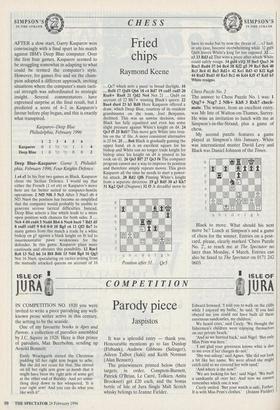UR
ISLE OF
iURA
_,,t„,„.,,,,.
COMPETITION
Parody piece
Jaspistos
IN COMPETITION NO. 1920 you were invited to write a piece parodying any well- known prose writer active in this century, the setting to be the seaside.
One of my favourite books is Apes and Parrots, a collection of parodies assembled by J.C. Squire in 1928. Here is that prince of parodists, Max Beerbohm, sending up Arnold Bennett:
Emily Wrackgarth stirred the Christmas pudding till her right arm began to ache. But she did not cease for that. She stirred on till her right arm grew so numb that it might have been the right arm of some girl at the other end of Bursley. And yet some- thing deep down in her whispered, 'It is your right arm! And you can do what you like with it!'
It was a splendid entry — thank you. Honourable mentions go to Ian Dunlop (Firbank), Andrew Gibbons (Salinger), Aileen Talbot (Saki) and Keith Norman (Alan Bennett).
The prizewinners printed below (their targets, in order, Compton-Burnett, Patrick O'Brian, Le Cane, Tolkien, Anita Brookner) get £20 each, and the bonus bottle of Isle of Jura Single Malt Scotch whisky belongs to Jeanne Fielder.
Edward frowned. 'I told you to walk on the cliffs while I enjoyed my bathe,' he said. 'If you had obeyed me you could not have built all these enormous sandcastles, my children.'
We heard cries,' said Cicely. 'We thought the fishermen's children were enjoying themselves on our private beach.' 'And so we hurried back,' said Nigel. 'But only Miss Prim was here.'
'I am glad your governess knows what is due to me even if her charges do not.' 'She was asleep,' said Agnes. 'She did not look a bit like her name. We were afraid she might catch cold so we covered her with sand.'
'And where is she now?'
'We are looking for her,' said Nigel. 'We built a sandcastle all over her. And now we cannot remember which one it was.'
Cicely smiled. 'But your watch is safe, Father. It is with Miss Prim's clothes.' (Jeanne Fielder) Jack Aubrey took up a poniard and sliced off his left ear. 'Here,' he said, turning to the emaciated figure of Maturin, 'you'll find it eats very much like pig.' My dear,' protested the surgeon, 'your generosity is equalled only by your improvi- dence. For all love let me stitch it back on.' `Stuff!' cried Jack. 'My starboard lug should answer tolerably.'
They sat amidships aboard the beached Speed- well, an hermaphrodite brig in which Jack had but recently tormented a French seventy-four. Weak knees, ill-pudden'd topgallantmasts and a lee shore had finally done for her in an unsea- sonable tramontane.
'Regard this seashell,' Maturin mumbled weakly. 'The dendriform radii speak against Duvalier's Theory of Progressive Calcification in the Lower Molluscs.'
I daresay,' said Jack, using a freshly severed big toe to caulk a scandalised spankerboom. `Now lend a hand here, Stephen — there's not a moment to be lost.' (David Jones) He was heading back, back to the Circus. After years of tradecraft, digging for moles, he was going back. Even the years spent as a lowly post- man and the spell in Oddbins seemed nothing to him now.
He took the ferry, careful to give the exact change. 'Moscow Rules,' he muttered, reading the graffiti on the rusty jetty. Later he would say if it wasn't for the cousins he would not have tried. But he was driven.
George had the proofs — at last, he had the proofs. Toby had passed them on the prome- nade without a word. Soon the YTS — the trainees that do the wet jobs — would stick up the posters. The big top would go up and Doris and Louise would again fly from the trapeze. But it would still be dangerous, for this was the Liverpool of Karla — or possibly, Carla Lane.
(Philip Stapleton) After many hours' journeying they came at last to the Grey Havens where there was a great host of folk, young and old, shouting with a great voice and consorting joyously together so that it seemed their cares were all forgotten in a fair morning. Far from the shore were the costly sta- blings for iron steeds; vigilant the officers of the city, footsore the travellers as they gained the margin of the sundering sea in the full glory of the day.
From the annals of the moment they fash- ioned headgear for the thwarting of the sun. In the grey glimmering waters they bathed their weary feet to the knees. They gazed at the Shore Folk. They ate everything except the tomatoes. They watched the gulls. They gazed at the sea. Suddenly, Legolas spoke.
`Galadriel!' he said. 'What does she know?' (Annelise McCardle) She gazed through the French windows of the Italian hotel north of Amalfi. Now, in winter, sludge-coloured sea reflected sludge-coloured clouds, a sea-mist drifting into the unkempt gar- den below. Not those happier childhood sum- mers she remembered. The deeper she dug her hands down, the deeper sagged the pockets of her ash-coloured cashmere cardigan, her spirits too. The irony was that still she could not pre- vent the schooled eye of the writer from watch- ing the scene, seeing herself standing there, brooding over an abominable plastic potted palm, observing herself observing herself, as it were. And crowding round her were the ghosts of those whose laughing faces haunted her, those she had thought were her friends, who had betrayed her. Though possibly they looked on her as the traitor, whom they had thought to be their friend; or perhaps, quite simply, she had betrayed only herself. (Monica G. Ribon)
No. 1923: The big one
Dr Watson refers to an unpublished case of Holmes, 'The Giant Rat of Sumatra' — 'a story for which the world is not yet ready'. You are invited to supply its opening (max- imum 250 words). Entries to 'Competition No. 1923' by 7 March.



























































 Previous page
Previous page